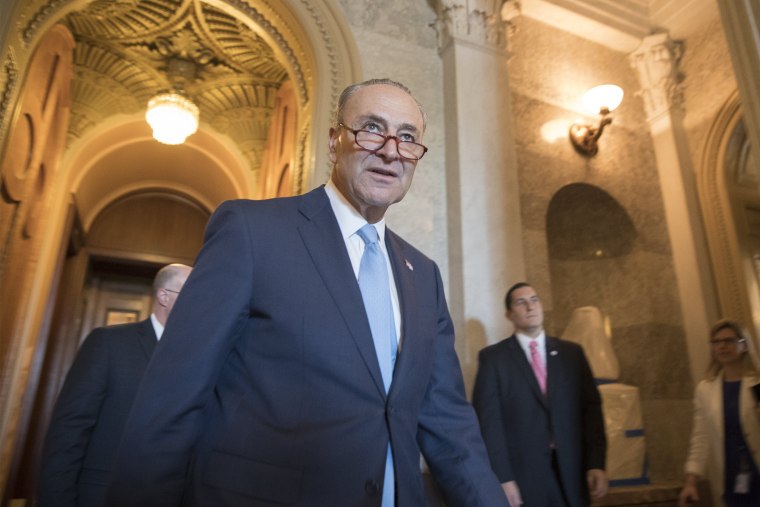For much of 2017, Donald Trump's principal complaint about Democrats was simple: they were "obstructionists" who refused to even consider working with him. "The Democrats have become nothing but obstructionists, they have no policies or ideas," the president tweeted in June. "All they do is delay and complain."
In Trump's mind, congressional Dems were, for all intents and purposes, acting like congressional Republicans did in the Obama era, slapping away an outstretched hand. No matter what the White House tried, Trump assumed, Democratic leaders would simply refuse to work with him -- just as GOP leaders refused to work with Obama, even when the Democratic president was prepared to give Republicans some of what they wanted.
If Barack Obama was for it, the GOP was reflexively against it, even when he agreed with his adversaries. Many Republicans, including the president, expected a continuation of this style of politics.
Trump's assumptions, however, were completely wrong. Dems such as Chuck Schumer and Nancy Pelosi hadn't really considered maximalist partisanship -- like a batter waiting for a pitch to swing at, they were simply waiting for an offer they could accept.
With apparent progress on DACA negotiations, this led The Daily Beast's Matt Lewis this morning to raise an important observation:
"Slightly surprised Dems are working with Trump -- even to advance their own agenda. Their attitude might have been: 'Why give him ANY wins?'"
In other words, Lewis is slightly surprised Democrats aren't acting like Republicans. When it comes to protections for Dreamers, Pelosi and Schumer could've taken a specific, GOP-like posture: rail against the White House's position, refuse to negotiate, turn the issue that cuts Democrats' way into a political cudgel, and use it to beat Republicans for months heading into the 2018 midterms.
But they're doing the opposite, and it's important to understand why. Indeed, this is one of the defining differences between the major parties, which is often underappreciated.
The political warfare that defines contemporary partisan disputes is profoundly asymmetrical: Democrats care about substantive outcomes and policy goals more than any other consideration. Dems certainly have their share of fierce partisan and ideologues, but the party itself is not defined by an ideological crusade or a constant search for electoral advantage.
If given a choice between protections for Dreamers or an opportunity to use Dreamers' plight for political gain, Democratic leaders en masse prefer the former to the latter. This might give Trump a "win" -- if the deal comes to fruition, he'll take credit for doing something popular and bipartisan -- but most Dems don't care, so long as the young immigrants get the protections they need and deserve.
For Republicans, this dynamic is flipped. The party's policy goals have largely been replaced with slogans and soundbites, and few in the party care about working on substantive outcomes. For much of today's GOP, an ideological crusade and a constant search electoral advantage is the driving motivation behind every decision.
Given a choice between working with Dems to achieve a goal and blaming Dems for standing in the way of the goal, most Republican leaders choose the latter, not the former.
It's the difference between a governing party and a post-policy party. The more Donald Trump is willing to make concessions, the more Pelosi and Schumer will work to advance their agenda.
